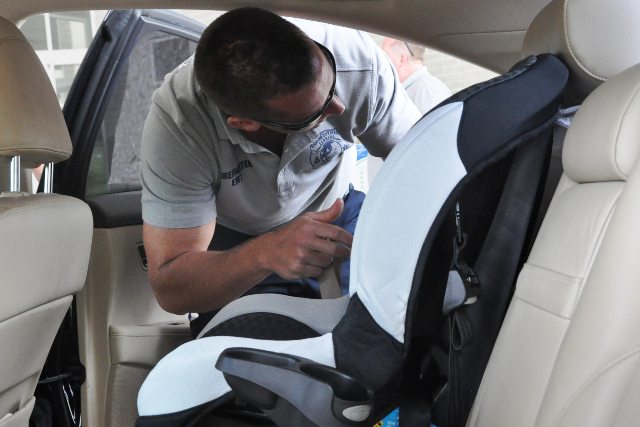Trusted traffic lawyer
Navigate the complexities of Car Seat Laws in Georgia with this comprehensive guide by Conoscienti and Ledbetter. Ensure your child’s safety and compliance today.
 Author: J. Blake Ledbetter, Partner, Conoscienti & Ledbetter
Author: J. Blake Ledbetter, Partner, Conoscienti & Ledbetter
Mr. Ledbetter specializes in civil litigation in metropolitan Atlanta, Georgia, and possesses vast experience in wrongful death lawsuits. Mr. Ledbetter was recognized as a SuperLawyers Rising Star in 2018 and 2019 in the area of Civil Litigation. Published on March 26, 2024.

Speak with experienced traffic lawyer today, for free.
Ensuring the safety of our children on Georgia’s roads is paramount. Georgia’s new car seat law mandates that children below eight be secured in a car seat or booster seat that’s appropriate for their age, height, and weight. These regulations are in place to minimize the risk of injury in the event of an accident, making compliance not just a legal duty but a critical measure for child passenger safety.
Car and booster seat guidelines are more than regulations—they are measures that keep our children out of harm’s way. Our goal at Conoscienti and Ledbetter is to empower our clients with this crucial information, combining our legal prowess with a dedicated, compassionate approach to their concerns. Whether addressing inquiries about legal compliance approved child restraint system or representing clients in related legal disputes, we draw upon our foundational values of honesty and efficiency to ensure the safety of Georgia’s youngest passengers reflects the law’s intentions.
Understanding Car Seat Laws in Georgia
In Georgia, protecting children on the roads and highway safety is a matter we take seriously at Conoscienti and Ledbetter. Our state’s concern for the safety of our youngest passengers is captured in O.C.G.A. 40-6-76, the state law requiring that all children under eight years of age be properly restrained in an appropriate car seat or booster seat at the back seat when on public roads or streets.
Rear-facing car seats are meant for infants, and it’s crucial to keep children in these seats until they attain the weight limit or height limit proposed by the seat’s manufacturer. Typically, infants from newborn to age one and weighing up to 20 pounds fall within this category. We recommend staying updated with the latest safety information provided by professionals such as those at the NHTSA.
Transitioning from a child rear-facing seat to a forward-facing car seat is the next step for children who have outgrown their rear-facing seats. In Georgia, children must be one year old and at least 20 pounds before being placed in a forward-facing seat. A forward-facing car seat is the safest option for children between the ages of one and three, who weigh between 20 and 40 pounds.
Once a child exceeds these limits, it’s time for a booster seat, which is employed until they are either big enough to use a motor vehicle with a seat or lap belt alone or turn eight. Regardless of age, safety relies on more than just the type of seat but also on proper installation and usage, which underscores the importance of following the manufacturer vehicle owner’s manual and guidance.
Few exceptions exist, such as medical conditions or the size of the vehicle, but these are rare and well-defined within the law. Non-compliance can lead to legal consequences and endangering the child’s well-being. At our firm, we emphasize that following these laws is not just about obeying the law; it’s about ensuring the utmost safety for your children. We take pride in promoting safe driving practices, including using car seats when adequately secured. Should you have any questions regarding car seat laws and how they may pertain to your situation, we welcome you to direct them to our team, who are well-versed in these and other regulations.

Speak with trusted traffic lawyer today, for free.
Types of Car Seats and Their Specific Laws
The Georgia law governing the use of car seats for children shows the commitment to child safety. We must understand the appropriate car seat based on our children’s age, weight, and height.
Rear-facing car seat: We recommend using this for newborns and infants. According to the Georgia Attorney General’s Consumer Protection Division, infants should ride in rear-facing car seats until they are at least one year old and weigh up to 20 pounds. If an infant weighs more than 20 pounds before one year, use a booster seat suitable only for heavier infants. For detailed guidelines, visit the Georgia Car Seat Safety Guide to ensure you stay within the law.
Forward-facing car seats: Once a child has outgrown the rear-facing car seat, we suggest transitioning to a forward-facing car seat. A child must be at least one year old and 20 pounds in Georgia. They should remain in a forward-facing seat equipped with a harness until they outgrow the manufacturer’s height and weight limits.
Booster seats: Height and weight determine when a child is ready to move from a forward-facing car seat to a booster seat. Although no specific booster seat weight requirements are mentioned in the law, our best practice is to keep our children in a forward-facing car seat with a harness until they reach the manufacturer’s maximum allowable height and weight.
Convertible car seats: These are versatile and can accommodate children from infancy through the toddler years as they convert from rear-facing to forward-facing. Always follow the passenger seat manufacturer’s instructions to ensure the car seat is used correctly at each stage of the child’s development.
Child restraint system: The law mandates that all children under the age of eight must be appropriately restrained in a certified child restraint system suited for their size and not a shoulder belt.
You need to adhere to these guidelines designed to provide maximum safety for children in vehicles. Early transition to the following type of car seat is not recommended until the child fully meets the necessary criteria. Here is further information to help you decide on the appropriate seat for the child in the front passenger seat and other restrained children in your car.
Legal Consequences of Non-Compliance
At Conoscienti and Ledbetter, we emphasize the gravity of adhering to Georgia’s car seat laws. Non-compliance can result in punitive measures that impact not just your legal standing but also the safety and well-being of your children. Understanding the legal consequences is crucial for any parent or guardian.
Should a driver be found violating car seat regulations—specifically, if a child under eight and shorter than 57 inches is not in the proper or appropriate car seat and position—it may be considered a primary offense. This alone can cause law enforcement to stop and cite a driver. The penalties for not complying with these laws can include:
-
Fines: Violators may be subject to fines. While the amount can vary, it is important to recognize that the financial cost pales compared to the potential risk to a child’s safety in a car crash.
-
Points on License: A seat belt offense can also add points to the driver’s license, which can accumulate and lead to further complications with one’s driving privileges.
Remaining informed about current and future changes to car seat legislation is vital. We advocate for utilizing official resources, such as the healthcare provider card from the Georgia Department of Public Health, which can offer guidance on car seat requirements and installation. By staying educated, parents and guardians can ensure compliance and prioritize the safety of their children on the road.

Don’t delay. Schedule a risk-free consultation today.
Conoscienti and Ledbetter: Your Partner in Child Safety and Legal Compliance
At Conoscienti and Ledbetter, we understand the gravity of Georgia’s car seat laws and their vital role in protecting our youngest passengers. We are dedicated to helping families navigate these regulations to ensure they are in full legal compliance, thereby safeguarding their children during every journey.
When legal issues intersect with vehicle safety, it’s essential to have experienced advocates on your side. We extend our assistance to those needing legal representation related to car accidents involving child passengers, ensuring total protection of your rights and diligently seeking justice.
In the unfortunate case of a vehicle incident, it is crucial to have proficient legal guidance that our firm can provide. We have unique insight into effectively managing insurance matters arising from such incidents.
We maintain an unwavering commitment to honesty, integrity, and compassion regarding our clients’ needs. Whether researching legislation, car seat safety, assisting with child car seat matters through alliances with the local fire department, or representing you in court, we are here to ensure Georgia car seat laws are upheld for the well-being of your children. Get in touch with us for a free consultation.
Decatur Office
(404) 373-5800
315 W Ponce de Leon Ave. Suite 400 Decatur, GA 30030






